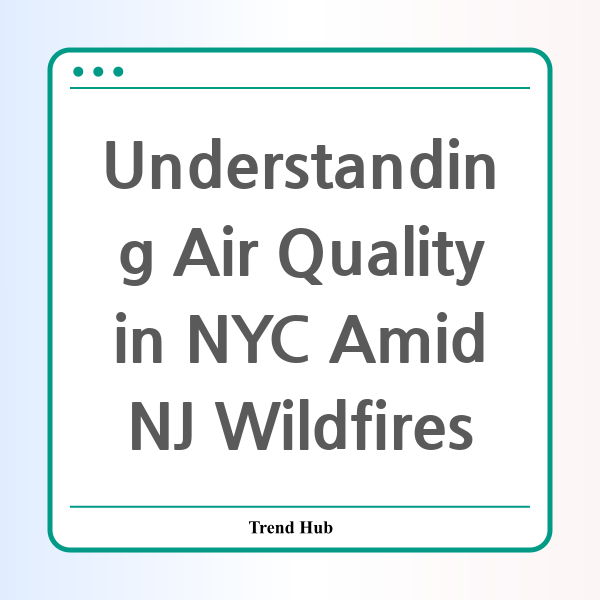* This website participates in the Amazon Affiliate Program and earns from qualifying purchases.

As the wildfires continue to rage in neighboring New Jersey, residents of New York City may find themselves asking: how does this impact air quality in my area? With over 13,000 acres burning and plumes of thick smoke being reported, the health effects and environmental challenges tied to air quality have never been more pressing. Let’s explore the current situation and its implications for NYC.
The recent Jones Road Wildfire in New Jersey has made headlines due to its rapid spread and the emergency situations it has caused. The fire, originating from the Greenwood Forest Wildlife Management Area, has already burned about 13,250 acres and prompted evacuations of around 5,000 residents. Acting New Jersey Governor, Tahesha Way, declared a state of emergency, highlighting the fire's potential to cause significant damage and public health risks. Fortunately, as of now, there have been no reported injuries, nor loss of homes.
But what does this mean for air quality in nearby cities, particularly New York City? As winds shift throughout the week, smoke from the New Jersey wildfires is expected to drift toward the NYC metropolitan area, potentially impacting air quality in several boroughs. According to environmental experts, the smoke carries particulate matter that can cause respiratory issues, irritate the eyes, and exacerbate conditions like asthma, especially among vulnerable populations such as children and the elderly.
New York City regularly monitors air quality through its Department of Environmental Protection (DEP). The DEP uses a wide network of air quality monitoring stations throughout the city to understand the levels of pollutants like ozone and particulate matter (PM). During wildfire events, other than local pollution sources, the incoming smoke can cause spikes in these particulate levels, warranting public health advisories.
So, how can NYC residents stay informed and protect themselves? Here are some tips:
- Check real-time air quality updates: Websites like AirNow provide up-to-date information on air quality levels around the country. Pay attention to the Air Quality Index (AQI) ratings.
- Limit outdoor activities: On days when air quality is poor, especially with smoke advisories in effect, reduce strenuous outdoor activities and stay indoors as much as possible.
- Use air purifiers: If you have air purifiers at home, ensure they are in good working order. They help filter out harmful particulates that can enter your living space.
- Stay hydrated: Drinking water helps keep your airways moist, which can alleviate irritation caused by air pollutants.
- Be vigilant about symptoms: If you or your family members experience respiratory issues, dizziness, or other concerning symptoms, seek medical advice.
In addition to immediate health concerns, these wildfires highlight the broader effects climate change has on fire risks and air quality. New Jersey has experienced a long-term drought which exacerbates the situation, suggesting that urban areas like NYC may face increasing air quality challenges due to neighboring wildfires in the future. This serves as a reminder of the interconnectedness of environmental health within our region and the necessity for ongoing public education regarding air quality.
As the situation remains dynamic, it’s crucial for residents of New York City to stay informed and take proactive measures to protect their health. With the potential for wildfire smoke to impact air quality significantly, vigilance and preparedness can make all the difference.
* This website participates in the Amazon Affiliate Program and earns from qualifying purchases.